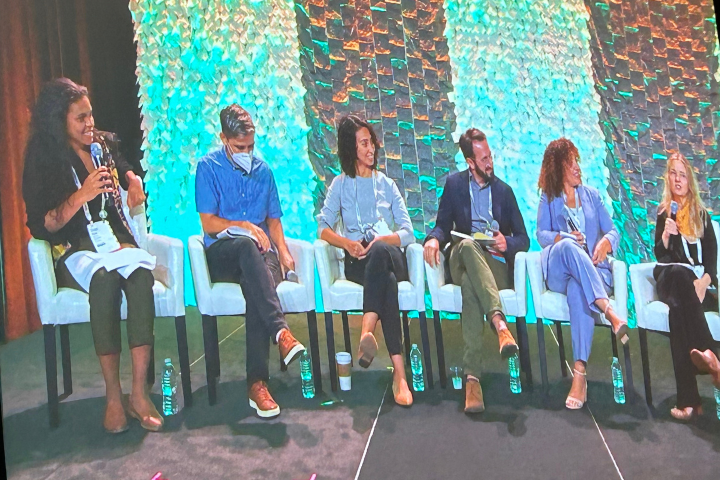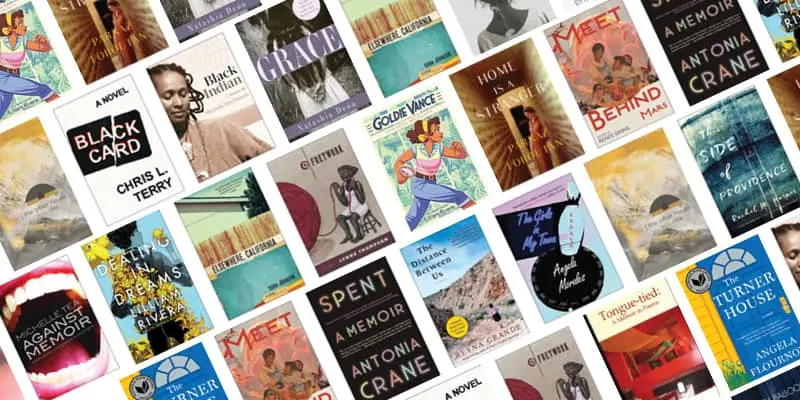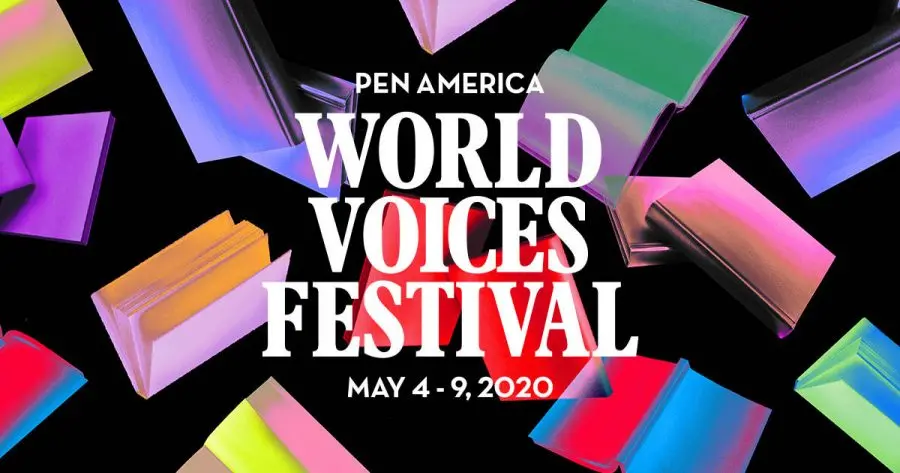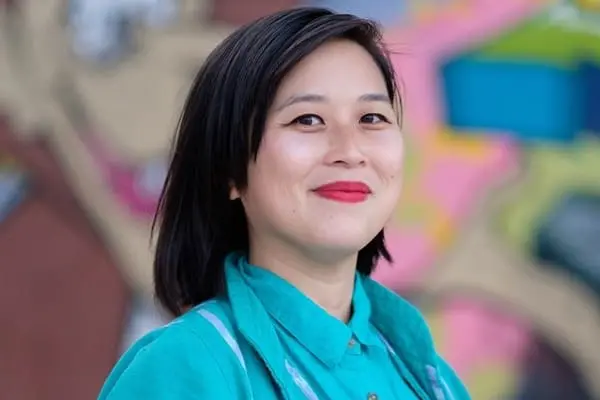
The PEN Ten is PEN America’s weekly interview series. This week, PEN America’s 2022 Emerging Voices Fellows, hailing from seven states across the country, provide insight into their creative processes, how they’ve developed as artists and writers, and what inspires their literary practice. PEN America’s Emerging Voices Fellowship provides a five-month immersive mentorship program for early-career writers from communities that are traditionally underrepresented in the publishing world. The fellowship nurtures creative community, provides professional development training, and demystifies the path to publication—with the ultimate goal of diversifying the publishing and media industries. Learn more about this year’s fellows »
*In the summer of 2022, EV Fellow Natáhne Arrowsmith passed away. A proud Cherokee Nation citizen, Natáhne created in myriad forms: music, poetry, essay, and fiction while living on an unceded Miwok territory with her husband, daughter, dog, and an ever-expanding colony of feral cats. Her novel in progress was titled THEY BREED LIKE RABBITS, a fictionalized story based on the research and interviews conducted for her mother’s master’s thesis on the U.S. government’s and IHS’s (Indian Health Services) campaign to sterilize Native American women. The book draws its title from a quote her mother found in a medical file as the reason stated for performing a radical hysterectomy on a healthy, 20 year old patient with no children. The doctor scribbled, “because they breed like rabbits.”
PEN America extends condolences to her family. Her husband, Russell Adamson III, answers on her behalf.
1. What was the first book or piece of writing that had a profound impact on you? Why?
Edythe Rodriguez: Definitely The Bluest Eye by Toni Morrison. I feel like a class could be taught on this book alone. As a Black woman reading the book, I was both Pecola and not Pecola. The way Morrison wrote her character I was forced to identify with her as well as look at my own complicity in certain oppressive systems. I’ve gifted this book so many times. It was other Black people who harmed Pecola the most in the book, which shook me. Our internalization of someone else’s hatred rippled through the community. Morrison held up a mirror to us and the ways we perpetuate harm against Black women and girls.
2. How does your writing navigate truth? What is the relationship between truth and fiction?
Iris Kim: I like to challenge my instincts to defend only my version of the truth. Much of my writing focuses on cultural and generational differences within the Korean American community and requires that I explore multiple realities. What I consider dogma may differ from my parents or my grandparents’ worldviews. But that’s understandable—they’ve lived through completely different political, economic, and societal shifts during their formative years. My perspective will always be more Western and Americanized.
It’s easy to fall into the trap of portraying my family members as simplistic and one-dimensional if they do not ascribe to my truths. Writing my family members on the page and fictionalizing their personas is my way of showing them that while we may hold contradictory beliefs, I’ll attempt to understand and love them all the same.
“Writing my family members on the page and fictionalizing their personas is my way of showing them that while we may hold contradictory beliefs, I’ll attempt to understand and love them all the same.”
3. Why do you think people need stories?
Christina Tudor: I kept trying to come up with an answer that sounded wise and intellectual – something about art imitating life or that we tell ourselves stories in order to live a la Joan Didion – and while I agree with these sentiments, I have a different answer: stories can save us.
Looking for Alaska has been my favorite book for more than half my life–for fourteen years. I return to it and gift it to people I love; I have a tattoo based on the central premise inscribed on my back–each letter painstakingly bubbled in. “I Go to Seek a Great Perhaps.” I read it for the first time while recovering from intensive surgery. I was immobile, isolated, and lonely. I couldn’t imagine a world where things would get better. Stuck on the living room couch, I read. My world opened up. I connected to the characters and invested in their mischief, longing, and heartbreak. That book saved me with one line that I’ll leave you with: “We need never be hopeless because we can never be irreparably broken. We think that we are invincible because we are.”
4. What was an early experience where you learned that language had power?
Julian Iralu: I grew up the youngest of four sisters with abusive parents in a household where self-expression was dangerous. I imagined my sisters were made up of the words our parents called us when they weren’t dishing silent treatment: “Sluts. Retards. Selfish Fools. Devil-possessed. Brain-damaged.” My sister Clare left me notes: Don’t even look at me. If I enter the room, leave. That will be safer. We always try to be safer. We have given up on being safe. Homeschooled. No escape.
We learned to destroy our writing — locking ourselves in the bathroom, softening the paper under the faucet, chewing and swallowing the paper, or flushing spitballs in the toilet.
My mother’s favorite game was a race to find the closest distance between two words: kiss miss mist most moot soot slot slut. The power of words imploded when my parents, unable to accept my sister’s decision not to be a part of their life, lied to me, saying she was dead. They turned words like compost to fit their narrative: slut slat slam seam sear dear dead.
I didn’t believe them because I am made up of sharp paper and my sisters’ warnings that I chewed and swallowed.
5. What is your relationship to place and story? Are there specific places you keep going back to in your writing?
S. Erin Batiste: For me, place is a living, breathing character in my poetry. My family made the lesser-known migration to the West, and so I inherited the South and grew up with Texas as both a backdrop and a haunting, even though I never lived there myself. I remember my grandparents holding court in the living room, the one we were all actually allowed to sit in, their stories thick with traditions and spirits and whole worlds contained within a few dirt roads. I was born in California, another mythological place, so I describe myself as Southwestern––equal parts cornbread, equal parts the valley. Like my grandparents, I left, searching for my own freedom and possibility. Today I represent two incomparable hometowns––Los Angeles and Brooklyn, specifically Bedford-Stuyvesant, a neighborhood that claimed me the day I set foot there four years ago and hasn’t let go since. But also, like my grandparents, the West has now become a ravenous ghost that follows me no matter where I am, I am forever a desert person, and its sun, skies, relentless summers, difficult animals and plants, and enduring, complicated folk also continue to show up in my work.
“As a part of my gratefulness and mindfulness practices, I remind myself that language far transcends the power of words and that I am in the spiritual, physical, and cultural lineage of people who did not always have access to or a means of creating ‘literature.’”
6. If you could claim any writers from the past as part of your own literary genealogy, who would your ancestors be?
Monica Mills: Poetry is the acknowledgment of tradition, innovation, emotion, and even mundanity held to the light; it’s the personal made communal and vice versa. A poem can be shared with laughter between friends, a bag of trash spilling over on the road, a moment of peace, a moment of hardship. We are all in the genealogy of such things. As a part of my gratefulness and mindfulness practices, I remind myself that language far transcends the power of words and that I am in the spiritual, physical, and cultural lineage of people who did not always have access to or a means of creating ‘literature.’ Those people whose voices were often not considered worthy of being heard or acknowledged are a part of my literary genealogy. I don’t believe a person can ethically ‘claim’ another person, literary or otherwise, but in terms of more concrete literary inspirations, the writings of Margaret Walker, Audre Lorde, Toni Morrison, Langston Hugues, Maya Angelou, and Gabriel Garcia Marquez awe and excite me for many reasons one being that I deeply subscribe to the idea that the ‘personal is political (a term popularized by Carol Hanisch) and the works of those writers (as well as my own) bear witness to that notion in one way or another. Each human being is made in the image of her or his (or their) ancestors and descendants, but our reflections are our own. As I consider my genealogies, I try to be mindful of the justice I’m doing for myself and others in this short time we share on earth.
7. What do you read (or not read) when you’re writing?
Connie Pertuz-Meza: When I am actively writing, I do not read anything in the genre I’m working on, which for me would be: young adult fiction, memoir, and essay. I do a lot of immersive reading before drafting or revising. When drafting or revising, I listen to a lot of music to pump myself up and move my body. Though there is more to these dance breaks, I’m connecting with the story. Whether it’s hip-hop, salsa, Spanish rock, or 80’s ballads, I’m closely listening to word choice, images, alliteration, rhythm in the lyrics, and of course, the emotion in the artist’s voice. This process inspires me to express the music in the story I’m drafting. In revision, I look for the musicality in my writing, what is singing on the page and what is flat. I love that moment when you hear a verse in a song, and it grabs you— the voice of the rapper or singer evokes strong emotion. It sets off a vibration, striking a chord, and for the briefest second, you are connected by this shared experience of feeling. While I don’t sing my stories, I intend for my heartbeat to be heard off the pages.
8. What’s something about your writing habits that has changed over time?
Sarah Chaves: When I wrote the first draft of my memoir while I was on a Fulbright in Portugal, I barely got up from the writing chair. I spent 8-10 hour a day hovering over my keyboard with barely a bathroom break. I was entrenched—some might say, obsessed—in the storytelling, determined to get it all out on the page. But once I returned to the U.S. and began walking in the shoes of my normal life, that version of my writing self vanished. I struggled to find the same commitment to my work as I did in Portugal. I used to argue that I never had enough time, that the responsibilities of a teaching career and budding family took up too much of my mental space. But recently, I’ve learned that the physical writing space is what I hold most sacred, and it is only in that space where I feel most secure—most hidden—that I can delve deep into the caverns of my mind. Of course, when I was on scholarship, I had the privilege of not being held to deadlines set by work or loved ones, but what kept me writing for all those hours was the sanctuary of that space—a royal blue rolling chair, a wooden desk, and a view of the ocean I felt I could get lost in. My current writing desk doesn’t have a view of the Atlantic. Still, instead, a hanging framed calligraphy of Edgar Allen Poe’s “The Raven,” a rotating pencil holder with decorative azulejos on each side, and a green and gold Banker’s lamp modeled after those in the Boston Public Library. I still may not get 8-10 hours of uninterrupted writing time, but I do write, and it’s only here in this space where the words flow most freely.
“As a writer, who I am and where I come from is central to my work. But my identity is a shifting organism, not a fixed point. I turn to fiction because it has the capaciousness to hold a thing in motion, to allow ourselves to embody and experience one another and resist easy definition.”
9. How does your identity shape your writing? Is there such a thing as “the writer’s identity?”
Jane S. Kim: Identity can serve as a type of complex shorthand. It gives us the power to declare ourselves to the world, but it can also flatten and politicize us in ways outside our control. My identity is liminal: I am a foreigner in South Korea, a hyphenated American, and what I am is often a negotiation of what I’m not. All my stories center around the Korean American community in Los Angeles. Still, this layered nature of identity — who we are, where we find belonging, and what we fail to recognize in each other — is the beating heart of my work.
Lynne Tillman explained that fiction “doesn’t make claims to truth or pronouncements or general statements about life, it narrates them.” As a writer, who I am and where I come from is central to my work. But my identity is a shifting organism, not a fixed point. I turn to fiction because it has the capaciousness to hold a thing in motion, to allow ourselves to embody and experience one another and resist easy definition.
10. What is a moment of frustration that you’ve encountered in the writing process, and how did you overcome it?
Doreen Oliver: The beginning of my novel was exciting and fun to write, but shortly after that, I reached an impasse. I’d start the next chapter, erase it, start again, then stop after a couple of paragraphs. Nothing felt right. Finally, I laid out all my frustrations in my journal and gave myself the following rules of freedom: 1) Write the book in whatever order you want, not in the order you think it should be. 2) Read someone else’s novel to clear your head or get inspired. 3) Handwrite if you need to. 4) Don’t force it – do or work on something else if it doesn’t feel right. The next day, while reading another book, the ending of my novel suddenly came to me! As I wrote (by hand), I realized the POV was in first person, though my opening chapters had been in third. The deeper I got into the novel, the more emotionally complex it became. For me to access the nuanced emotions of the character, I needed to be closer to her, if you will, and write it from the first-person perspective. It was a great discovery and one that came to me only when I started to relax and open myself up to other ways of thinking about writing a novel.
11. What does your creative process look like? How do you maintain momentum and remain inspired?
Shakeema Smalls: My creative process begins with everyday living and being in communion with spirit and memory in the best ways I know how. Many poems come to me in my quiet moments, like when I’m washing dishes or in a meditative state. I’ll recall a conversation I heard or make a connection with a memory, triggering a question for me. I stopped pretending I’ll always have a pen and paper handy when my mind wanders, so I usually have my phone to record times like these and for revision. Inspiration feels good and comes quickly but dissipates almost as fast. I appreciate what being inspired feels like, but I also motivate myself by consistently following through on drafting and revising my work. Revision is a valuable part of my overall writing process as it allows me to follow both the question(s) underlying a work-in-progress as well as its execution. It’s also a time when I can be disciplined enough to pull myself out of my stream-of-consciousness and engage with my work, as well as with others I may be in conversation with. I maintain focus by returning to my work daily, in whatever capacity. I try to remain curious. I also prioritize keeping clear lists of tasks I need to get done in various areas of my life so that I don’t find myself cleaning the baseboards when I should be writing.
12. What did programs and opportunities such as the Emerging Voices Fellows mean to Natáhne, and by extension, to you? How, if at all, did it help with the way she viewed herself as a writer?
Russell Adamson III (Husband of the late Natáhne Arrowsmith):I cannot begin to express how grateful I am to the Emerging Voices Fellowship and PEN America for this amazing opportunity you provided for Natáhne. She was scared to embark on this journey but more joyful and excited for the future than I had seen in decades. She was not, by nature, traditionally scholarly but rather a seeker of knowledge, a compiler of ideas, a self-directed individualist, and an artist. I am continuously comforted that she decided to submit her piece first so that her fellow fiction writers could witness her unique voice and storytelling ability. The reception and acknowledgment of the importance she felt in her story gave her so much confidence that she was indeed on the proper path. The support she found in the PEN community cannot be understated.
Throughout our 30 years together, we would often discuss future desires and wishes, but always in the semi-serious, dreamy fashion (where we were going to sell everything and live off the land on a compound with friends up the coast of California). In her first meeting with her mentor, he asked her, “What do you want?” She downplayed and responded humbly. Over the next few days, she rethought, and the dreamy wishes we had talked about for her writing career became concrete. At the next meeting, she corrected herself and stated boldly all the lofty goals she was setting for her art. All the support and belief that everyone in the fellowship had given her through this process was a real validation of her true artistic desires. It gave her the strength to finally step through decades of self-doubt and fear and proclaim, “I am a proud Cherokee woman and storyteller. This is what I want, and I am going to get it.”





